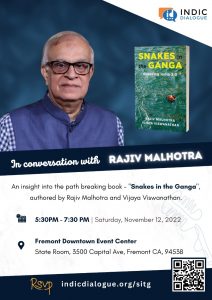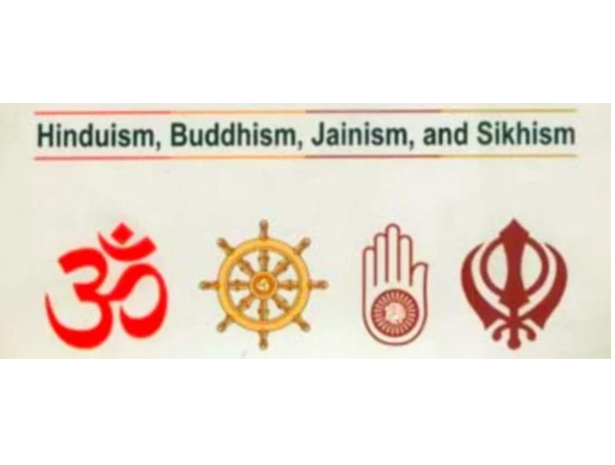
Dharma’s Universal Glow: How Hinduism, Jainism, Buddhism, and Sikhism Embrace Duty Over Dogma
By Madhu Hebbar
Imagine you’re on a quest to understand how to live a good life. You might come across Hinduism, Jainism, Buddhism, and Sikhism, four ancient traditions from India. At first glance, they might look like religions because they have spiritual teachings, rituals, and communities. But dig deeper, and you’ll see they’re more about dharma—a way of living righteously—than rigid religious rules. Unlike religions that often focus on specific beliefs or gods, these traditions emphasize dharma, a universal guide for doing your duty that promotes harmony in both theory and practice. Let’s explore how these traditions prioritize dharma over religion and why this creates unity, explained in a way an 8th grader can understand, with quotes from sacred texts to light the way.
What is Dharma vs. Religion?
First, let’s clarify the terms. Religion is like a structured club with set beliefs, sacred texts, rituals, and often a god or gods. Think of Christianity with its Bible or Islam with its Quran—both have clear rules and practices tied to faith in a specific divine power. Religions can be exclusive, requiring followers to accept certain truths, which sometimes leads to division when beliefs clash.
Dharma, a Sanskrit word meaning “duty,” “righteousness,” or “the way things should be,” is different. It’s like an inner compass that guides you to do what’s right based on your role, circumstances, and the moment. A student’s dharma might be studying and being kind, while a parent’s dharma involves caring for their family. Dharma is universal, applying to everyone, regardless of beliefs, and it focuses on actions over faith. It’s flexible, personal, and aims to create harmony by aligning your life with the world’s natural order.
Dharma in Hinduism
Hinduism, one of the world’s oldest traditions, is deeply rooted in dharma. It teaches that everyone has a unique dharma based on their stage of life, role, and situation. The Bhagavad Gita, a key Hindu text, emphasizes this through Lord Krishna’s advice to the warrior Arjuna. A famous quote says:
“śreyān sva-dharmo viguṇaḥ para-dharmāt sv-anuṣṭhitāt sva-dharme nidhanaṁ śreyaḥ para-dharmo bhayāvahaḥ” (Gita 3.35), meaning “It is better to perform one’s own dharma imperfectly than another’s perfectly.” This shows that Hinduism values following your personal duty—like being a good student or honest worker—over blindly adhering to universal rules or beliefs.
In practice, Hinduism’s focus on dharma creates harmony by respecting diverse paths. Hindus might worship different gods (like Vishnu or Shiva) or none, yet all are united by the idea of living righteously. Festivals like Diwali bring communities together to celebrate good over evil, reflecting dharma’s universal call for kindness and justice, not rigid dogma. This flexibility allows Hindus to coexist peacefully, even with varied practices.
Dharma in Jainism
Jainism centers on dharma as a path to non-violence (ahimsa) and self-discipline. Jains see dharma as the ethical conduct that leads to the liberation of the soul. A key text, the Tattvartha Sutra, states: “Samyag darshana jnana charitrani moksha margah” (Sutra 1.1), meaning “Right perception, knowledge, and conduct are the path to liberation.” Here, dharma is about living with truth, non-violence, and restraint, not worshipping a specific god or following a single doctrine.
In practice, Jains embody dharma through strict non-violence, like avoiding harm to even tiny creatures, and vegetarianism. This creates harmony by fostering compassion for all life. During festivals like Paryushana, Jains reflect, forgive, and renew bonds, uniting communities without demanding uniform beliefs. Jainism’s dharma is inclusive, encouraging anyone to practice ethical living, making it less like a religion and more like a universal guide.
Dharma in Buddhism
Buddhism, founded by Siddhartha Gautama (the Buddha), revolves around the Dhamma (Pali for dharma), which means the teachings of righteous living to end suffering. The Buddha’s Dhammapada says: “Sabba papassa akaranam, kusalassa upasampada” (Verse 183), meaning “Avoid all evil, cultivate the good.” This highlights dharma as ethical actions—kindness, mindfulness, and wisdom—rather than faith in a deity or rigid rituals.
Buddhist practice promotes harmony through meditation and the Eightfold Path, which guides people to live ethically, like speaking truthfully and acting compassionately. Events like Vesak, celebrating the Buddha’s birth, unite Buddhists worldwide in peace and reflection, not dogmatic worship. Buddhism’s dharma is open to all, regardless of background, focusing on personal growth over religious exclusivity, fostering unity across cultures.
Dharma in Sikhism
Sikhism, founded by Guru Nanak, emphasizes dharma as living truthfully and serving others. The Guru Granth Sahib, Sikhism’s holy scripture, declares: “Dharam di kirt karni” (SGGS, p. 137), meaning “Earn your living through righteous deeds.” This reflects dharma as honest work, equality, and devotion to truth, not adherence to a specific religious structure.
Sikhs practice dharma through seva (selfless service) and langar (community kitchens), where everyone, regardless of faith or status, eats together. This creates harmony by breaking down social barriers. During festivals like Vaisakhi, Sikhs celebrate community and justice, uniting people without requiring uniform beliefs. Sikhism’s dharma is a call to ethical living that anyone can follow, making it less about religion and more about universal duty.
Harmony in Theory and Practice
In theory, dharma unifies Hinduism, Jainism, Buddhism, and Sikhism because it prioritizes universal values—duty, compassion, truth—over fixed beliefs. Unlike religions that might insist on one god or truth, dharma adapts to each person’s life, as seen in quotes like the Bhagavad Gita’s call to follow your own path or the Dhammapada’s focus on good deeds. This flexibility allows these traditions to coexist, as they share the goal of righteous living without competing over dogma.
In practice, dharma fosters harmony through inclusive actions. Hindu festivals, Jain forgiveness rituals, Buddhist meditation gatherings, and Sikh community service all emphasize ethical conduct over belief, welcoming people of different backgrounds. For example, a Sikh langar serves Hindus, Muslims, or atheists alike, embodying dharma’s universal spirit. Historically, these traditions have lived side by side in India, sharing spaces like temples and festivals, because dharma encourages mutual respect rather than division over beliefs.
Why Dharma Over Religion?
Calling these traditions “religions” can miss their essence. Religions often have strict rules, exclusive beliefs, and a focus on faith, which can divide when groups disagree. Dharma, however, is about how you live—your duties to yourself, others, and the world. Hinduism, Jainism, Buddhism, and Sikhism use dharma to guide people toward harmony, not to enforce one “right” way. Their texts, like the Mahabharata’s “Dharmo Vishwasya Jagatah Pratishta” (“Dharma is the foundation of the entire world”), show dharma as a universal force uniting all.
By focusing on dharma, these traditions avoid the rigidity of religion. They don’t demand you worship a specific god or join a group. Instead, they offer a path anyone can follow—be kind, do your duty, live truthfully. This inclusivity creates harmony, as seen in shared values like non-violence (Jainism, Buddhism) or service (Sikhism, Hinduism), which bridge differences.
Why It Matters
Understanding that Hinduism, Jainism, Buddhism, and Sikhism prioritize dharma over religion helps us see their true power. They offer a way to live well that’s open to everyone, fostering peace in both ideas and actions. Their focus on dharma—backed by timeless teachings—shows how to unite people through shared values, not divide them with dogma. So, when you hear these traditions called religions, remember they’re more like guides to dharma, lighting a path to harmony for all.
Madhu Hebbar, an engineer, is an IIT graduate, living in the greater Los Angeles area. He is a practicing Hindu and an avid reader who is interested in Eastern philosophies and their general application to Western challenges. He is engaged in coaching youngsters interested in Hindu civilizational history, universal values, and their modern-day relevance. He has contributed to many intellectual engagements for a decade-plus in the Hindu community across the U.S. He is a keen student /observer of the media, trying to understand motives, narratives, and their impact on people and society.
Disclaimer: The views and opinions expressed here are those of the author and do not necessarily reflect the official policy or position of Indic Dialogue.

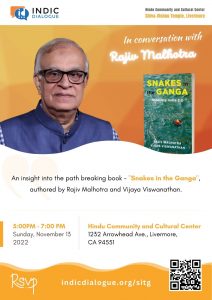
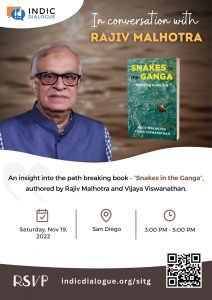
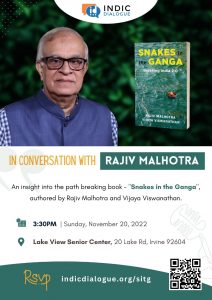 RSVP – IRVINE, CA
RSVP – IRVINE, CA